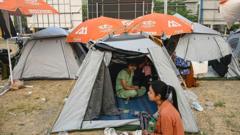Once a secluded haven of natural beauty, Al-Ula in Saudi Arabia is rapidly transitioning into a tourist hotspot, prompting fears of losing its untouched allure.
Al-Ula: Saudi Arabia's Evolving Landscape of Tourism and Development

Al-Ula: Saudi Arabia's Evolving Landscape of Tourism and Development
The desert oasis of Al-Ula is on the brink of transformation as tourism projects reshape its ancient terrain.
Al-Ula, Saudi Arabia, a breathtaking expanse renowned for its sandstone and granite formations, is on the verge of a tourism-driven metamorphosis. As the kingdom ushers in a new era, following its embrace of global tourism, Al-Ula is caught in the wave of change that is transforming the once-remote locale.
Since opening its gates to travelers six years ago, Saudi Arabia has experienced a remarkable shift. Al-Ula, with its striking landscapes and ancient rock tombs—historically part of the Nabatean empire, which also crafted the famed Petra—now stands juxtaposed with the pressing influx of tourists reminiscent of the bustling scenes in nearby Dubai.
In 2025, this urgency feels paramount; explorers eager to bask in the untouched serenity of Al-Ula face the reality that their clandestine escape may soon vanish. The area, currently free of excessive commercial encroachment, is set to host a multitude of hotels and tourist attractions in the forthcoming years, drawing parallels to the overcrowded Petra experience.
Yet, the unclouded transformation to a tourist-friendly destination does not erase the kingdom's complex socioeconomic past. Visitors remain wary, considering Saudi Arabia’s historical challenges related to civil liberties, strict cultural policies, and ongoing debates around women's rights. Although significant strides have been made—like allowing women to drive and travel without restrictions—the anticipation of major events, such as the 2034 World Cup, might compel a reevaluation of certain cultural prohibitions, including alcohol sales.
While the broader cities of Riyadh and Jeddah thrive, showcasing modernity and sufficiency, the fate of Al-Ula hangs in the balance. As developments loom, many question whether this oasis will retain its essence or ultimately transform into yet another crowded tourist attraction as the nation continues to forge a new path within the global sphere.



















